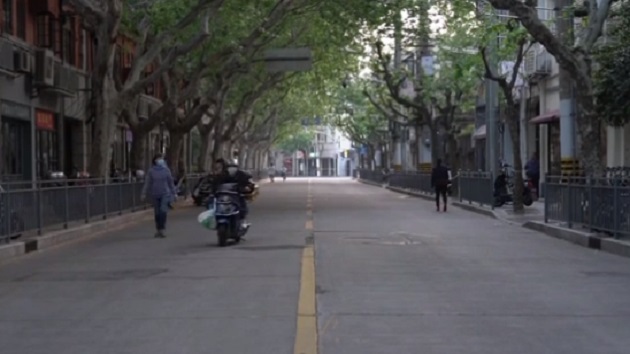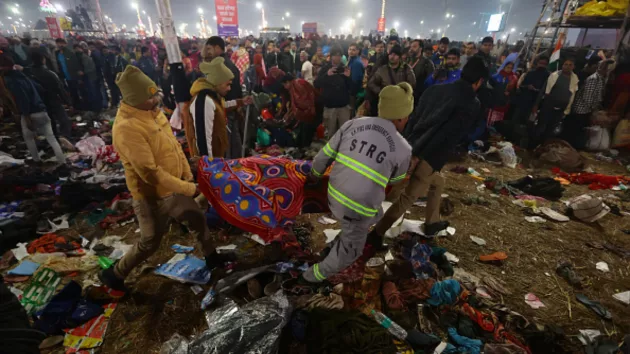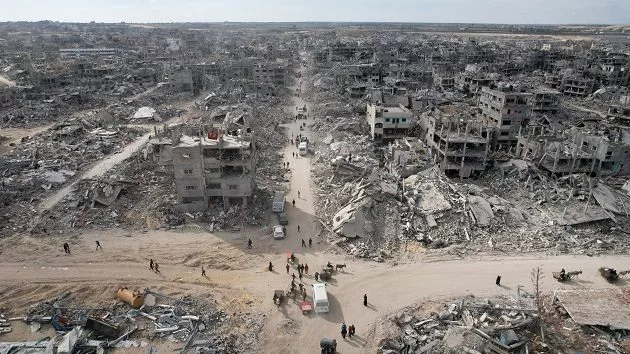
(HONG KONG and NEW YORK) — As countries around the world slowly emerge from the COVID-19 pandemic, China is battling its worst outbreak as the last holdout of a hardline “Zero-COVID” policy.
Residents are growing increasingly weary in Shanghai, where a lockdown of 25 million people is entering its fifth week. Cases in the economic powerhouse fell to their lowest levels in weeks on Thursday, raising hope that authorities might ease lockdown measures.
Kenie, a Shanghai resident whose last name ABC News is not including for privacy reasons, has been confined to her home with her two kids and elderly parents since March.
Like others in Shanghai, they are facing a shortage of food and finding it difficult to get deliveries. Kenie said in her neighborhood in the suburbs of Shanghai, the government rations are sparse, and she’s been forced to eat one meal a day so her kids and parents can eat more.
“I cannot cook because we have nothing to cook. I have only instant noodles left,” said Kenie. “Actually, I feel very disappointed and depressed.”
Kenie was finally able to source some insulin for her diabetic father through a friend, but she said authorities weren’t helping her find the medicine.
She was once supportive of the Chinese government’s policies, but her view has changed since she’s had to endure such tough conditions in lockdown.
“I’m angry, but I have no choice,” she told ABC News. “You feel helpless. I have no power to use. I’m angry, but I’m here. I don’t have any right to do something.”
Kenie said she’s more fearful of being sent to the city’s isolation facilities where everyone who tests positive must be sent than of the virus itself. The official death toll is comparatively low. In Shanghai, there have been nearly 300 deaths from more than half a million infections since the lockdown began.
Alessandro Pavanello, who moved to Shanghai several years ago to study and now lives there with his girlfriend, recorded his experience at one of the isolation facilities this month where he said he had no showering facilities or privacy.
While some expats have chosen to remain quiet out of concern for the consequences, Pavanello said he felt the need to share something he “was not OK with.”
“Sure, people have been quiet about this issue, presumably because they are maybe interested in staying in China after all this happens or they are afraid of repercussion,” he said.
Pavanello said that while in quarantine for six days, he lost weight and gained new grey hairs. He said that only sleeping for four hours each night and being constantly surrounded by loud sounds affected his mental well-being.
“A lot of other people that I have talked with that have been going to these places suffered in a variety of different ways, but mostly on their mental health, which I think is one of the aspects that was never taken into consideration when they decided here to start creating these isolation centers,” he said.
Other residents are also questioning a policy in which the social and economic costs are mounting.
Yet Chinese President Xi Jinping appears determined to stick with the country’s no-tolerance “Zero-COVID” policy, whatever it takes.
The toolkit of lockdowns, testing and surveillance helped China suppress infections to relatively low levels in the first two years of the pandemic, but with each new variant, maintaining the approach has become difficult.
China political expert and former State Department official Susan Shirk told ABC News’ “Nightline” last week that “Zero-COVID” required “a system of social control that was much more invasive, expansive, than anything that most other countries would be able to carry out.”
Shirk said the consequences of China locking down its economic powerhouse will be felt globally. Shanghai is home to one of the world’s major shipping ports, and cargo ships are currently backed up around the coast.
“We should care because it definitely is going to affect our ability of our economy to function smoothly,” Shirk said, “The disruption of the supply chains, aggravating inflation, is going to make our economic lives more difficult too.”
Two weeks ago, American writer Jamie Peñaloza, who lives in Shanghai, was remaining optimistic. The former chef made the most of the situation, getting creative with government food rations by making ricotta cheese out of milk supplies.
Now, Peñaloza’s tone has shifted after losing her main freelance job and seeing videos of harsh life in lockdown.
“It’s a bit like Groundhog Day in a bad way. It’s a bit surreal,” she told ABC News.
Peñaloza said she’s lucky compared with others who have experienced food shortages, but she feels a sense of helplessness.
Pavanello is now back at home in Shanghai, but he’s tested positive again and is worried he may be sent back to a facility.
The residents ABC News spoke with shared a common sense of helplessness, as if they were on a merry-go-round of restrictions and easing, with no end in sight.
Peñaloza said she is sticking it out in China for the near future, while Kenie and Pavanello both expressed plans to leave because of what they’d experienced under lockdown.
“I don’t know when this is going to end, and there’s nothing I can do about this,” said Pavanello.
As Peñaloza said, “One person can test positive and that just sets the score back to zero.”
Copyright © 2022, ABC Audio. All rights reserved.







